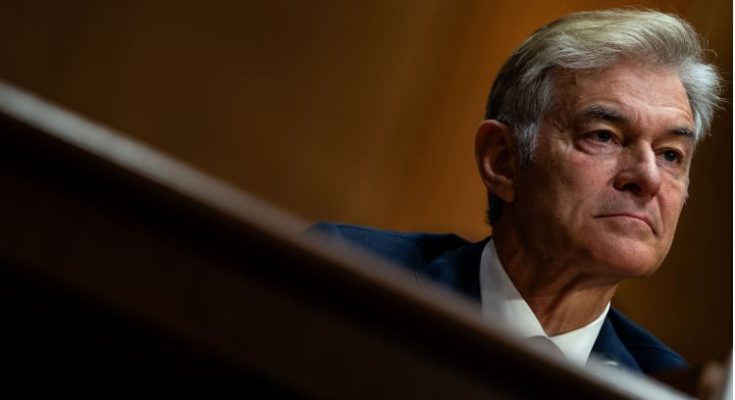Mehmet Oz, President Donald Trump’s nominee to lead the agency that oversees millions of Americans’ health insurance, said he hopes to improve people’s life expectancy.
Mehmet Oz repeatedly avoided promising to oppose cuts in the Medicaid health insurance program for the poor and highlighted the importance of keeping the Medicare trust fund solvent as senators questioned him at his confirmation hearing Friday.
If confirmed in an upcoming Senate vote, the cardiothoracic surgeon turned daytime TV star and failed Republican Senate candidate would take over the sprawling Centers for Medicare and Medicaid Services (CMS), which is responsible for more than $1 trillion in annual spending.
Oz dodged attempts by several members of the Senate Finance Committee to get him to commit to protecting Medicaid from cuts, avoiding answering the question directly.
Sen. Maggie Hassan (D-New Hampshire) pushed back, arguing that potential Medicaid cuts could cripple access to care in rural parts of her state.When asked by a Washington Post reporter after the hearing whether he opposed cuts to Medicaid, Oz turned and walked away.
Hassan also grilled Oz on whether he stood by weight-loss claims he made about green coffee extract and raspberry ketone supplements.
“You have been nominated to run the largest set of health programs in the United States of America, and it seems to me you still are unwilling to take accountability for your promotion of unproven snake oil remedies to millions of your viewers, and that’s really concerning,” she said.
Oz said he was proud of work he did on his television show. “There are many things I said on the show. I take great pride in the research we did at the time to identify which of these work or which ones didn’t,” he said. “Many of them are still being researched, like the green coffee bean extract you just mentioned.”
Despite criticism from Democratic senators, Oz maintained that “our biggest enemy is nihilism, is a lack of hope that we can fix what’s going on at CMS.”
Finance Committee Chairman Mike Crapo (R-Idaho) noted the “high stakes” for the agency that Oz would lead. He stressed the need to ensure the program is “sustainable and stable,” and he lauded Oz’s emphasis on a preventive care approach to medicine, saying it would “save lives and taxpayer dollars.”
Sen. Roger Marshall (R-Kansas) asked Oz for his prescription to improve American performance against chronic disease. “There is not enough sick care out there to save Medicare and Medicaid,” Marshall said.
Oz responded that “the deeper promise that we should all be making to America is we’re going to make it easy for America to do the right thing when it comes to their health,” Oz said. He said he was considering providing people incentives to improve their health.
The hearing played to some of Oz’s strengths, with the nominee focusing on preventive care and avoiding some of the responsibilities of CMS’s leader, said Richard Besser, president and CEO of the Robert Wood Johnson Foundation and former acting director of the Centers for Disease Control and Prevention.
“Dr. Oz is very effective on television and very effective at motivating people to eat right and exercise,” Besser said. He noted that that is more the role of the U.S. surgeon general than the head of CMS.
In his opening remarks, Oz commanded the room with his TV-honed speaking style, mentioning his family, his background as a physician and the multiple Emmy Awards he has won.
He highlighted the need to avoid insolvency in the Medicare trust fund and emphasized the importance of improving Americans’ life expectancy.
“This public health crisis threatens our national security. Why? Because it adds to the national debt that is defeating us from within,” he said. “Let’s be aggressive in modernizing our tools to reduce fraud, waste and abuse. This will stop unscrupulous people from stealing from vulnerable Americans and extend the life of the Medicare trust fund.”
When several senators on both sides of the aisle stressed the need to focus on rural America’s health-care access, Oz vowed to support it with telehealth and other solutions.
He promoted the use of artificial intelligence to limit health-care redundancy and inefficiencies and signaled he would be open to Medicaid work requirements.
Confronted by senators about nursing home staffing requirements put into place by the Biden administration, Oz indicated he was willing to overturn them.
Oz deftly navigated combative questions throughout the hearing, which was punctuated with more laughter than most conversations about arcane health-care regulations.
Asked about Medicare Advantage — Medicare-approved health plans offered by private companies — Oz noted he would like to investigate whether a questionable billing practice known as upcoding was costing patients and taxpayers. He told Sen. Elizabeth Warren (D-Massachusetts) he would rather cut down on that than Medicaid.
He railed against the “big guys” in health care, criticizing private equity and pharmacy benefit managers.
Oz stressed the importance of nutrition and preventive care in saving government health-care dollars, saying it is Americans’ “patriotic duty” to be healthy. He also pointed to AI and other technological advances in his efforts to “Make America Healthy Again” — the slogan of his potential boss, Health and Human Services Secretary Robert F. Kennedy Jr.
That movement is feeling good about Oz’s chances, said Brigid Rasmussen, the chief operating officer for MAHA Action, the advocacy group led by a longtime Kennedy ally.
Rasmussen pointed to Oz’s experience with both Western and alternative medicine as an asset.
But preventive care physician Alankrita Olson said she came to Oz’s hearing to represent physicians against his confirmation.
Wearing a white coat, she said Oz’s “previous history selling controversial treatments that are not supported by science on ‘The Dr. Oz Show’ make it hard to believe he would have the best interest of the people, of the seniors, the disabled and the low-income people he will be covering care for.”
Oz returned to the Senate over a decade after he was grilled in a 2014 hearing convened by the Senate commerce subcommittee on consumer protection and product safety. Then-Sen. Claire McCaskill (D-Missouri) pushed Oz to explain why he promoted products that medical experts questioned, including a pill that “literally flushes fat from your system.”
Among the top questions Oz will face if confirmed is whether he will expand access to weight-loss drugs — which could put him at odds with Kennedy, an outspoken critic of such drugs. “They’re counting on selling it to Americans because we’re so stupid and so … addicted to drugs,” Kennedy said in October.
The expansion of Medicare access for the weight-loss drugs would cost an additional $35 billion between 2026 and 2034, according to the Congressional Budget Office, even including savings for improved health conditions.
Oz has disclosed an income ranging from $2.8 million to $15.9 million for him and his wife, ethics disclosures show, for 2024 through early 2025. The pair said they have combined assets worth between $95 million and $340 million, according to a Post analysis, which includes up to $50 million Oz lent his 2022 Senate campaign in Pennsylvania.
Sen. Ron Wyden (D-Oregon), the Finance Committee’s top Democrat, pressed Oz on his taxes. Oz avoided paying some Medicare and Social Security taxes for three years by using an accounting tactic that has been questioned by the government, according to a memo prepared by Senate Finance Committee Democratic tax staff and obtained by The Post. Oz and his advisers told committee staff that the tax maneuver is allowed.

